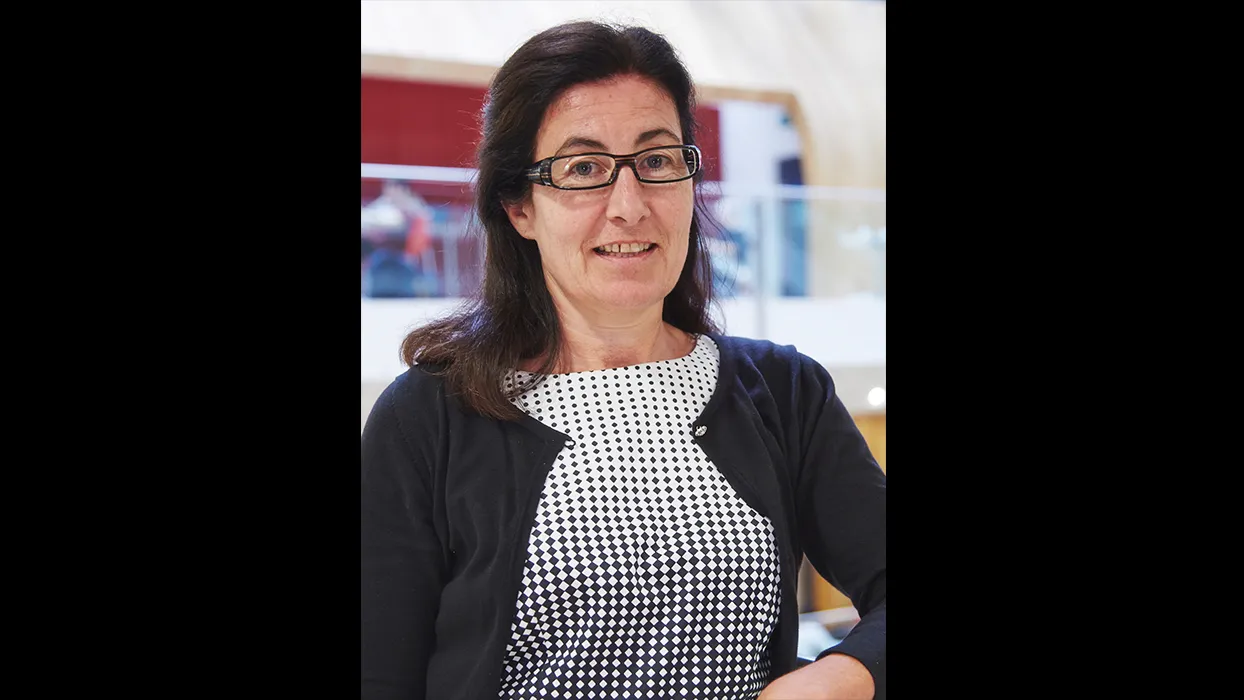Joe Gutierrez | CSUSB Office of Strategic Communication | (951) 236-4522 | joeg@csusb.edu

Cal State San Bernardino management professor Jacqueline Coyle-Shapiro was recently inducted into the Fellows Group in the prestigious Academy of Management for making significant contributions to the science and practice of management.
Coyle-Shapiro, who joined CSUSB’s Jack H. Brown College of Business and Public Administration full-time this past academic year, becomes one of just over 200 fellows worldwide to the academy, which is the preeminent professional association for management and organization scholars.
“This is one of the highest honors in our field. Professor Coyle-Shapiro brings a wealth of knowledge to the classroom based on her extensive research and teaching experience,” said Mike Stull, management chair and director of the Inland Empire Center for Entrepreneurship. “We are pleased to have her as a part of our team at CSUSB, as it gives students an opportunity to learn from one of the leading minds in the management field.”
Coyle-Shapiro is a top expert on psychological contracts as well as organizational behavior, justice and change. She has been cited more than 9,000 times in Google Scholar, an index of scholarly works.
Colleague and public administration professor Montgomery Van Wart called Coyle-Shapiro an “academic heavyweight” as her work has been published in top journals such as the Academy of Management Journal, Journal of Applied Psychology, Journal of Organizational Behavior, and Journal of Vocational Behavior.
“I am stunned at and overjoyed by our good luck to have such an academic star join us,” said Van Wart, noting that she was also the recipient of many teaching awards at the London School of Economics, ranked 9th in World University Rankings, where she took a leave of absence to join CSUSB.
Coyle-Shapiro’s latest research highlights the role of managers in setting the stage for how employees perceive fairness in the organization. For example, in these times of uncertainty, employees who feel that they have been fairly treated in the past by their organization will use that experience as a way of coping with the future and will have a more positive view of how their organization will treat them post COVID-19.
Another area managers might consider during this time of the COVID-19 pandemic are psychological contracts, or unwritten expectations of the employment relationship beyond the formal employment contract. This has significant implications for productivity, creativity and turnover, as well as an impact on the work environment.
“COVID-19 is presenting an unprecedented challenge for organizations as many will find it difficult or impossible to fulfill its side of the deal for their employees,” said Coyle-Shapiro. “Many employees will experience (psychological) contract breach due to job insecurity, delays in promotion and promised pay raises not materializing, but many will blame the pandemic instead of the organization.”
Given the jolt provided by the pandemic, both employers and employees will have to revise the nature of their exchange relationship to varying degrees, said Coyle-Shapiro.
Support for work flexibility is key as organizations try to resume operations in a world that contains greater uncertainty. Proactive employees with organizationally relevant skills may be in a better position to shape their post-COVID-19 relationship with their employer, she said. And, organizations have the opportunity to demonstrate their cultural values through how they treat their employees. For many employees, they will have to accept that what the employer will provide might be constricted at least in the short term as cost savings become the modus operandi for many businesses.
Coyle-Shapiro took a leave of absence from the London School of Economics (LSE) to join CSUSB. At the LSE Coyle-Shapiro served in a number of capacities in the Department of Management in Organizational Behaviour including: faculty group lead, head of the Employment Relations and Organizational Behaviour, professor, reader, lecturer and half-time lecturer. Prior to that, she was a lecturer at the School of Management, University of Oxford.
She serves on various editorial boards including the Journal of Applied Behavioral Science, Journal of Management and the Journal of Managerial Psychology. She also has served as the consulting editor for the Journal of Occupational and Organizational Psychology.
Coyle-Shapiro was awarded a doctorate from the London School of Economics, a master of business degree from University College Dublin, a diploma in business studies from the London School of Economics and a bachelor of commerce degree from University College Dublin.
Founded in 1936, the Academy of Management’s worldwide membership are professors and doctoral students in business schools at universities, academics in related social science and other fields, and practitioners who value knowledge creation and application. Its global community today is nearly 20,000 strong and spans over 120 countries.